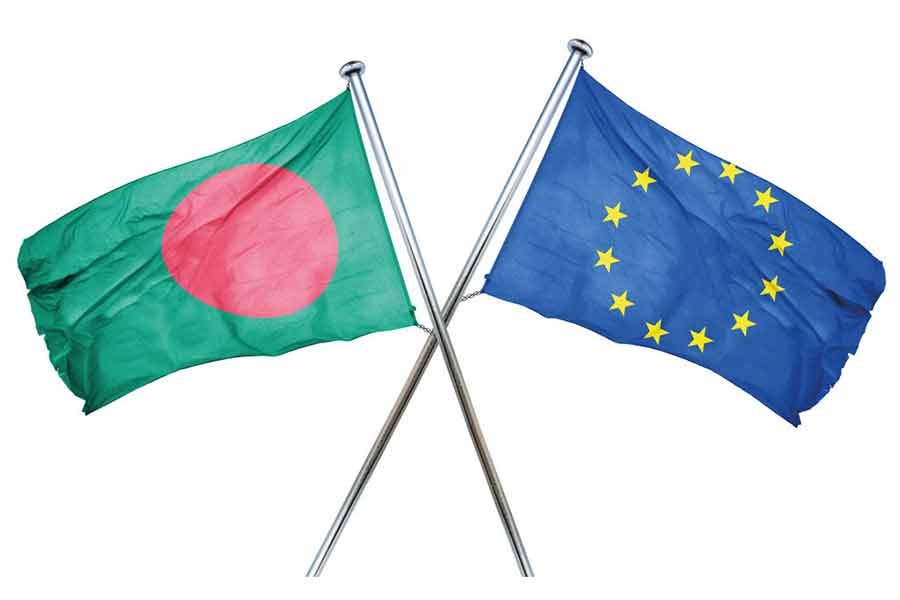1973 was an eventful year. The Watergate scandal, the end of the war in Vietnam and the international oil price crisis following the Yom-Kippur-war all took place in 1973. The European Union (EU) saw its first enlargement, increasing its number from six members to nine. Furthermore in 1973, the EU established relations with a country that had just gained independence two years earlier: Bangladesh. This newly founded state, which had around 67 million inhabitants at the time, organised its first general election in the same year and also joined the movement of non-aligned countries.
Half a century later, Bangladesh almost tripled its population and following the great economic progress of the recent decade is now being heralded as a "new Asian tiger". Meanwhile, the EU expanded to 27 Members and today represents the largest single market area in the world. It also remains the most highly integrated regional organisation with 448 million people united in cultural diversity.
The advancements in Bangladesh-EU relations have reflected these spectacular developments: in 2001 the EU-Bangladesh cooperation agreement was signed which laid the foundation of trade relations with the European Union that provided Bangladesh duty-free access to the Union market under the Everything But Arms (EBA) initiative. EBA played a crucial role for Bangladesh in becoming the European Union's largest trading partner - today, more than half of Bangladesh's exports go to the EU, and the country recently even overtook China as the biggest exporter of garments into Europe.
Cooperation has intensified over the years and now includes new priorities such as climate change and green energy, but increasingly also a security dimension. The pandemic, which hit neighbouring countries hard, was well managed by Bangladesh. The vaccination rate, supported by a 250 million EU loan for procuring Covid-19 vaccines, was among the highest in the region and economic growth remained close to an impressive 7 per cent. In 2022, Bangladesh-EU relations reached a new pinnacle with the first ever political dialogue being held between the two sides, cementing these and future areas of cooperation, such as Bangladesh's participation in the EU CRIMARIO project to improve maritime security and safety in the Wider Indian Ocean.
But some decisive challenges remain for the coming years: Bangladesh's transition to a middle income country will trigger an update of trade relations and potential access to the EU's GSP-plus scheme, requiring Bangladesh to fulfil a number of conditions related to labour rights, human rights, good governance and environmental standards.
A major challenge that is having the most serious impact on Bangladesh and the EU alike is the Russian aggression against Ukraine. As we approach the one year mark of Russia's unprovoked military action against Ukraine it is important to recognise that this is a blatant violation of one of the most fundamental rules of international law and the UN Charter.
In many ways, the war in Ukraine mirrors some of the events of 1973: a global energy crises, high inflation and strained international relations - further aggravated by food shortage and climate induced natural disasters. These issues do not only dominate the international agenda of high politics, but have a very concrete impact on the daily lives of ordinary people. In its illegal war against Ukraine, Russia is using food as a weapon. Elevated food prices and scarcity of supplies are causing millions of people around the world to struggle.
Contrary to Russian claims, EU countries are helping Ukraine export its agricultural products, following a months-long blockade of Ukraine's Black Sea ports by Russia. Since May 2022, over 23 million tonnes of grain and oilseeds were exported via the so called "solidarity lanes". Furthermore, the EU has progressively imposed sanctions against Russia. These measures were designed in such a way as to not affect exports of grains and fertilisers, but to target sectors of the Russian economy, as well as entities and individuals.
On the international stage, the EU was grateful to count on Bangladesh's support in these crucial times: in October last year, defending the principles of the UN Charter, Bangladesh voted for the EU sponsored UN resolution in support of Ukraine's territorial integrity.
Like the crises of 1973 changed the way we look at the world, the year 2023 might represent another turning point. The pandemic and the war in Ukraine, for all the suffering and sacrifices that have been endured and are still being endured, have worked as a catalyst for what the EU has labelled the "green and digital double transformation". It means upgrading our global energy and digital networks to make them fit for a carbon neural economy. The EU's Global Gateway initiative that seeks to connect country and regions supports this transition and already has a flagship project in Bangladesh, focusing on renewable energy.
The past 50 years of the Bangladesh-EU relationship have been transformative. They have seen both sides undergoing fundamental changes, while forging a close partnership in the process.
H.E. Charles Whiteley, Ambassador/Head of Delegation of the EU to the People's Republic of Bangladesh; H.E. Winnie Estrup Petersen, Ambassador of Denmark to the People's Republic of Bangladesh; H.E. Marie Masdupuy, Ambassador of France to the People's Republic of Bangladesh; H.E. AchimTröster, Ambassador of Germany to the People's Republic of Bangladesh; H.E. Enrico Nunziata, Ambassador of Italy to the People's Republic of Bangladesh; H.E. Anne van Leeuwen, Ambassador of the Kingdom of the Netherlands to the People's Republic of Bangladesh; H.E. Francisco de Asís Benítez Salas, Ambassador of Spain to the People's Republic of Bangladesh; and H.E. Alexandra Berg von Linde, Ambassador of Sweden to the People's Republic of Bangladesh. Towheed. [email protected]


